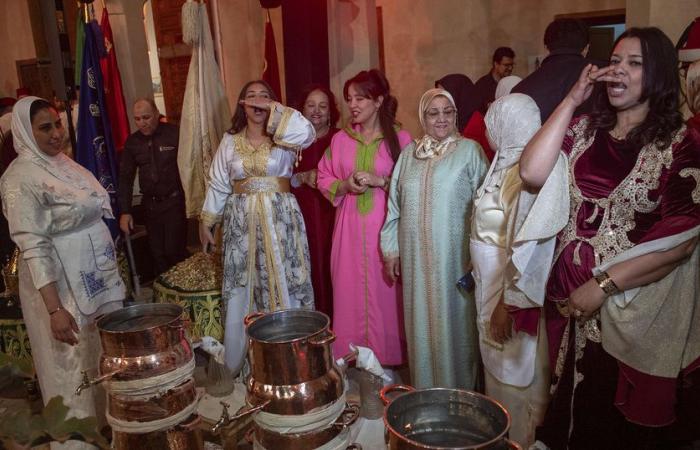The Minister of Justice, Abdellatif Wehbe, unveiled today Tuesday in Rabat, during a communication meeting, the main amendments proposed as part of the revision of the Family Code, on which was held yesterday , Monday, a royal working session.
Wehbé declared, during the same communication meeting in the presence of ministers, government officials, heads of constitutional bodies and presidents of the two houses of Parliament, as well as members of the Supreme Scientific Council, that “among what has was approved, there were on the proposals of the mandated body and the legitimate opinion of the Supreme Scientific Council, while the body presented 139 proposals for amendments. “.
The most important amendments proposed regarding “polygamy” aim to stipulate “that it is obligatory to consult the opinion of the woman when drafting the marriage contract as to her condition whether he does not marry her or not , and to stipulate it in the marriage contract.” If it is stipulated that she must not marry, the husband is not entitled to polygamy to fulfill this condition.
In the absence of this condition, the “exceptional objective justification” of polygamy will be limited to: the sterility of the first wife, or an illness which prevents marital relations, or other cases that the judge evaluates according to specific legal norms, which are of the same degree of objectivity and exception.
Custody and inheritance
The most important proposed amendments plan to “make legal representation a right shared between spouses during the marital relationship and after its separation.” If a dispute arises regarding the legal work of the public prosecutor’s office, it is referred to the family court judge who will decide, in accordance with clear legal controls and standards.
As for custody, “custody is considered a right shared between spouses during the marital relationship, with the possibility of extending this right after divorce if both parties agree.”
The divorced mother’s right to custody of her children has also been “reinforced, even in the event of marriage, and the right to housing of the child in custody has been guaranteed”, while “new controls for visits or travel with the child in custody has been organized, so as to guarantee the interests of the child,” according to what the Minister of Justice reads.
As for inheritance, “the proposal of the Supreme Scientific Council regarding the inheritance of daughters was approved, which allows the possibility of giving funds to living heirs, provided that legal possession is considered sufficient.”
Among the most notable developments is also “the opening of the way to wills and donations between spouses in the event of religious differences”.
Marriage of a minor
Concerning “underage marriage”, the age of marriage has been set at 18 full solar years, with an exception that allows marriage at the age of 17 if strict conditions are met to ensure protection.
It was also decided to “strengthen judicial review to ensure that exceptions remain within necessary cases only”.
Wehbe said in this regard: “Eligibility for marriage for a boy and a girl is determined at 18 full solar years, with the exception of the above-mentioned rule, in which the age of the minor is fixed at 17 years, several conditions being set. framed so that it remains, on request, in the exceptional circle.
Engagement and marriage
The amendments provide “the possibility of documenting the engagement and adopting the marriage contract alone to prove the marriage as a general rule, while specifying exceptional cases to approve the hearing of the matrimonial claim and strengthening the guarantees for the marriage of a person in a state of disability, with a review of the formal and administrative procedures necessary for the establishment of the marriage contract.
It was also provided for “the possibility of contracting marriage for Moroccans residing abroad without the presence of two Muslim witnesses if this is not possible.”
Transparency and procedures
The most significant amendments also included “reducing the time limit for adjudicating divorce and divorce cases to a maximum of six months,” while “adopting electronic means to document contracts and communicate court decisions.”
According to the Minister of Justice, in his capacity as a member of the body responsible for modifying the Code, it was decided to include in the new Code “the creation of mediation and reconciliation organizations to resolve family conflicts before to resort to justice.”
Note royale
Speaking to the media, Wehbe said: “We are honored to announce two things: On the one hand, His Majesty the King congratulates the members of the body responsible for revising the Family Code for their competence, their objectivity and their dedication demonstrated in carrying out the task entrusted to them, as well as for their contribution to the development of an integration project. in-depth revision of the Family Code.
On the other hand, “His Majesty’s appreciation for the jurisprudential legal opinion of the Supreme Scientific Council, and the role of the scientific body responsible for issuing fatwas in its formulation, in light of the officer that His Majesty has always emphasized that the Commander of the Faithful neither permits what is forbidden nor forbids what is permitted.
Deficiencies and imbalances
The Minister of Justice stressed that “the content of the revision of the Family Code aims to fill some of the inadequacies and imbalances that appeared during its judicial application, and to harmonize its requirements with the development and dynamism of Moroccan society, as well as with the requirements of Moroccan society. sustainable development, as well as its compatibility with legislative developments, including the international agreements that it has ratified “Our country”.
The government concluded by saying: “Today we are faced with a fundamental revision of the text of the Family Code, which responds to the principles and references specified by the Royal Message, and in accordance with the controls and limits that it sets; Its objective is to achieve a new version of the Family Code adapted to today’s Morocco, capable of responding to the societal developments it is witnessing, while ensuring that its requirements ensure, at the same time, the promotion of the status and rights of women, protection of children’s rights and preservation of men’s dignity.”






